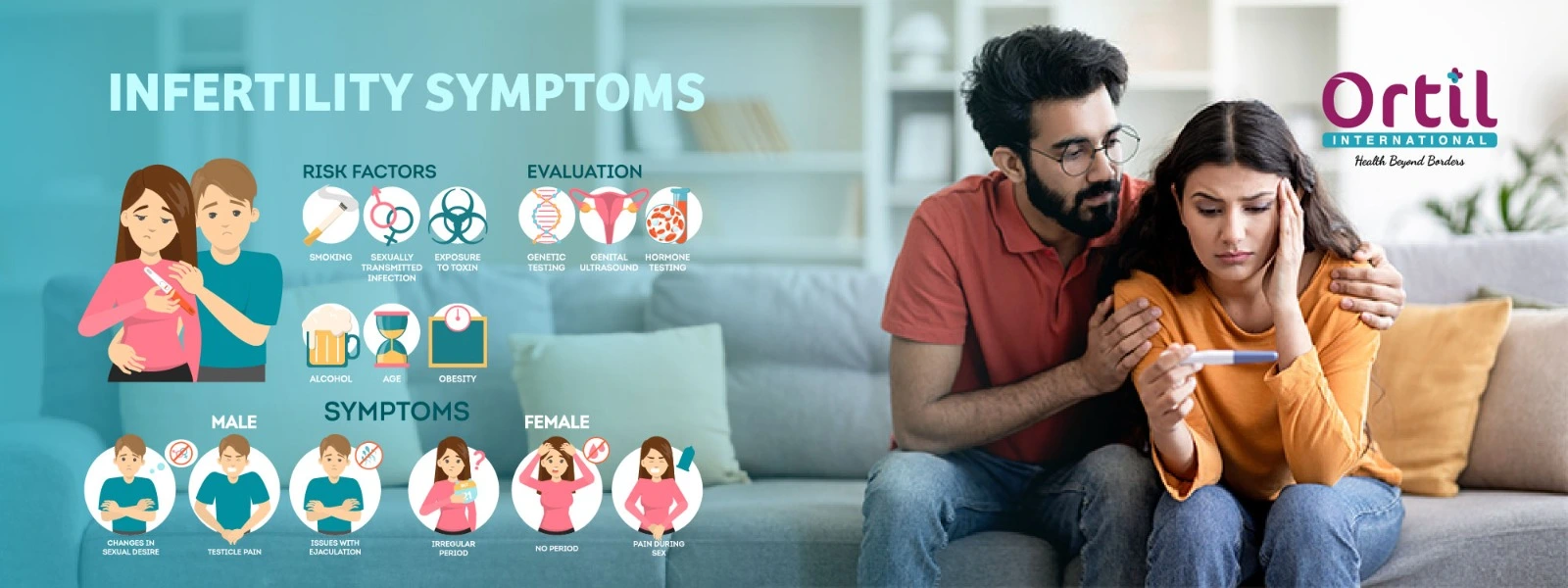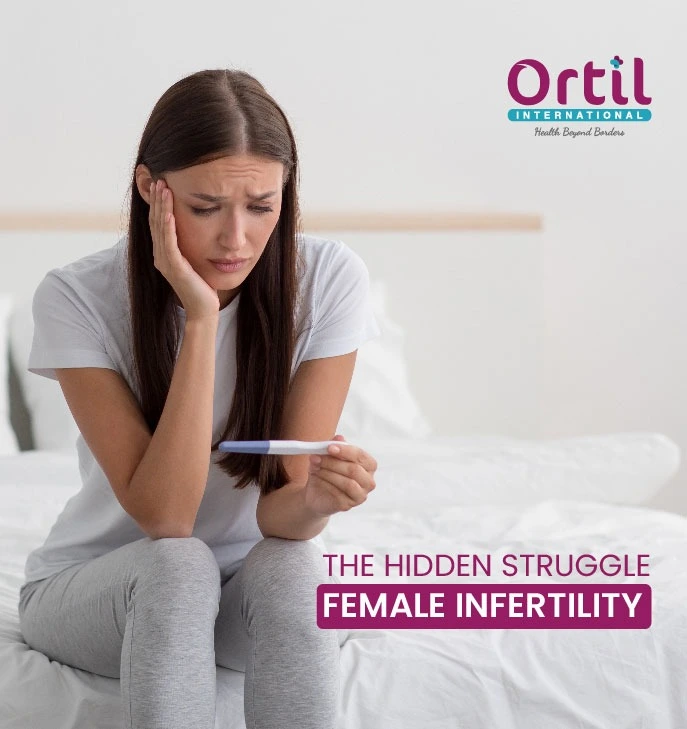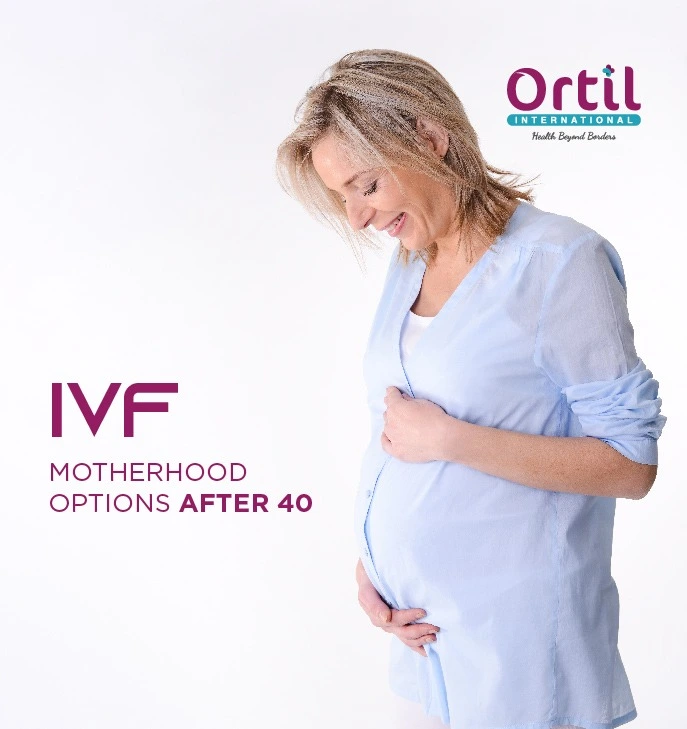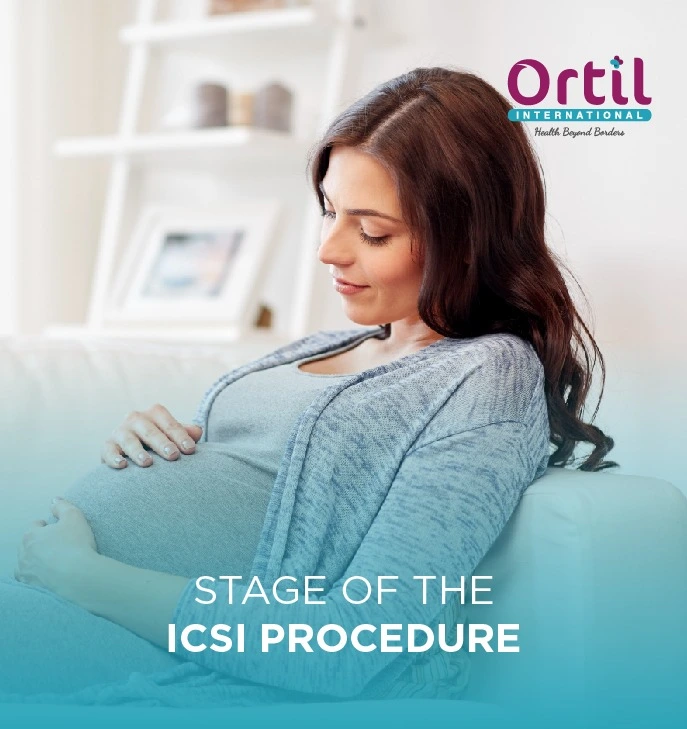Female Infertility Types, Causes & Symptoms
Female infertility can be a complex matter that cannot be resolved with a hard and fast rule. Each patient has a unique cause of infertility, and for this reason, each female requires an individualized treatment according to the type and cause of her infertility. What affects fertility in females can be a complicated matter, so it is important to understand infertility in detail.
Let’s discuss the types, causes, risk factors, and treatment of female infertility so that you can better understand it.

What is Female Infertility?
If a female is trying to get pregnant by natural means for a year and sees no positive results, then she is suffering from female infertility. The cause of infertility can be different for each female. About one-third of infertility occurs due to female infertility. The cause of infertility can sometimes be challenging to find out, but the fertility specialist plans a treatment according to the cause of infertility.
What are the Types of Female Infertility?
For females, there can be many causes or types of their infertility. There are a number of factors that can affect the fertility of females, and each factor affects the unique process of any step or normal functioning. Some of the types of female infertility are described below:
- Ovulation disorder
- Polycystic ovary syndrome (PCOS)
- Endometriosis
- Cervical tumor
- Fibroids
- Infection
- Block of fallopian tubes
- Hormonal imbalance
- Obesity
- Pelvic Inflammatory Disease
- Sexually Transmitted Diseases
- Uterine Insufficiency
- Idiopathic infertility
- Primary Ovarian Insufficiency
- High level of prolactin
- Fallopian tube disorders
- Hypothalamic dysfunction
Any disease of the reproductive system can affect fertility and can create problems in normal functioning like ovulation, egg production, and implantation. Treatment of infertility is also selected according to each type of infertility and its unique cause.
How Common is Female Infertility?
A recent report from WHO shows that a large number of people are affected by infertility worldwide. The rate of infertility is rising due to the changing lifestyle and other factors. Some of the important aspects of the prevalence of infertility are described below:
- About 1 in 6 females face infertility at some point in their lives.
- Fertility affects usually 17.5% of the adult population.
- The infertility rates are similar across different, which shows that it is a major health issue globally.
- In high-income countries,17.8% of people experience infertility.
- In low- and middle-income countries, 16.5% of the population experience infertility.
How Can you Identify the Female Infertility?
What are the signs of infertility in females? If you are facing challenges in conceiving, then it may show that you have some problem in your reproductive system. The symptoms and causes of female infertility can be different according to the pathology of your reproductive system. Let’s see what the symptoms of infertility are in females.
Look for the following symptoms of female infertility if you suspect problems with your reproductive system:
- Irregular periods
- Absent periods
- Painful periods
- Hormonal changes
- Obesity
- Underweight
- Excessive hair growth
- Acne
- Pelvic pain
- Recurrent miscarriages
- Age over 35
What Can Cause Female Infertility?
The most common and leading cause of female infertility is related to the problems of ovulation. Ovulation disorders are the most common cause of infertility in women. Other factors can also affect the fertility of a woman, which may include the age of the woman, her weight, her environment, and her lifestyle changes.
What are the Risk Factors for Infertility?
You may be exposed to different types of risks of infertility without your knowledge. Let’s look into these risks that can affect your reproductive health, the chances of conceiving, and the support of pregnancy:
- Advanced age
- Smoking
- Excessive alcohol consumption
- Obesity
- Underweight
- Sexually transmitted infections
- Irregular menstrual cycles
- History of pelvic inflammatory disease
- Certain medical conditions like endometriosis or polycystic ovary syndrome (PCOS)
- Exposure to environmental toxins
- Use of certain medications
- Excessive stress
How Can Your Age Affect your Infertility?
If you are a female and have the plan to delay pregnancy until your late 30s or early 40s, then it is very important for you to understand how your age affects your fertility.
Your ovaries and the quality of eggs decrease with your age. These changes occur without any symptoms or signs. The negative effect of age happens more rapidly than one can expect. A woman's best fertility or reproductive age ranges from the late teens to the late 20s.
However, fertility, or the ability to conceive, starts decreasing around age 30. After the age of 45 years, fertility decreases and makes making natural conception a challenging task.
Diagnosis and Tests to Find Out Female Infertility
Your fertility specialist can recommend any of the following diagnosis tests to you. Diagnosis of female infertility typically involves the following:
Medical History Assessment : your doctor can ask you some questions about menstrual cycles, past pregnancies, medical conditions, surgeries, and lifestyle factors to determine the cause of infertility.
Physical Examination : You may have to undergo a physical exam in which your doctor assesses the reproductive organs and overall health.
Ovulation Assessment : Ovulation assessment is one of the important tests to find the cause of infertility in females. It is done through methods like basal body temperature charting, ovulation predictor kits, or hormonal blood tests.
Hormonal Tests : You must undergo some blood tests to measure hormone levels, including ovulation-related ones.
Imaging Tests : Ultrasound can also be performed to see the reproductive organs and to find any abnormality in structures.
Hysterosalpingography (HSG) : HSG is an X-ray procedure in which the uterine cavity and fallopian tubes are assessed.
Hysteroscopy or laparoscopy : these are minimally invasive procedures to directly visualize and assess the uterus, fallopian tubes, and ovaries for any abnormality.
Genetic Testing : Screening for genetic conditions that may affect fertility or increase the risk of miscarriage can also be performed to see your cause of infertility.
Ovarian Reserve Testing : Ovarian reserve measures the quality and quantity of your eggs available for ovulation.
How Should you Know if you are Fertile or Not?
You are fertile if you have the following signs:
- Your menstrual cycles occur regularly without any early, late, or missed periods, and there is no bleeding between cycles.
- You have obvious signs of ovulation, such as the presence of mucus.
- You have normal hormone levels in your blood.
- You are a non-smoker.
- You are younger than 35 years old.
- You do not experience any reproductive complications or other health conditions.
- Your stress levels are not excessively high.
How is Female Infertility Treated?
Usually, your specific cause of infertility is a key to selecting a suitable treatment for you. Your doctor finds out the cause of infertility and then plans an individualized treatment for you. The female infertility can be treated with the following methods:
Medications : Your doctor may prescribe you some medicines that promote the ovulation process. Some medications can also be used to stimulate high-quality egg production.
Reproductive Assistance : Some reproductive assistance procedures are also available for you, and you can also select anyone according to your suitability. These may include IVF and IUI.
Surgery to Re-Store Fertility : Laparoscopic surgery or surgery in which blocked fallopian tubes are treated can also be recommended according to your cause of infertility.
Can you Prevent Female Infertility?
There is no hard and fast rule to know about what makes a woman infertile. Female infertility cannot be predicted, and that is why it is not always possible to prevent infertility. However, lifestyle modifications such as a balanced diet and exercise can improve fertility health. Proper diet and lifestyle modifications are what increase fertility in females.
You can maximize your fertility health by avoiding alcohol consumption, excessive use of caffeine, and certain foods like saturated fats and high sugar or processed foods.
Conclusion
In conclusion, female infertility can be of many types, and it can be treated with specific treatments according to the particular cause. However, some risks of female infertility can be avoided.
FAQ's of Female Infertility
What can I expect if I have infertility?
Infertility can be treated with proper evaluation and an individualized treatment plan.
When Should I see my Healthcare Provider about Female Infertility?
You should consult with your healthcare provider after a year of trying to conceive or after six months if you are over 35.
What Makes a Woman More Fertile?
Factors like regular cycles and a healthy lifestyle can increase fertility.
Can Stress Cause Infertility?
Yes, stress levels can negatively affect fertility. It is essential to manage high stress levels to improve the outcomes of fertility treatments.


























